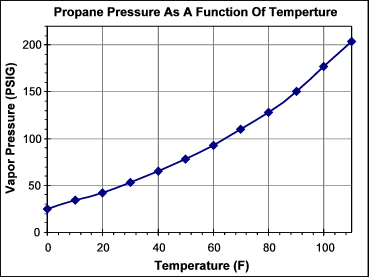Propane
Propane is probably the most common fuel used by builders of higher-end combustion launchers - and with good reason too. It is powerful, easily metered, clean burning, widely available and inexpensive.
Propane can be injected the same way an aerosol fuel would, but it is common to devise a method to carefully control the amount metered into the chamber; often a conventional fuel meter or large syringe is used, although using the pre-mixed fuel mixture from an unlit propane torch is convenient for fueling very small launchers.
It is important that the fuel/air mixture be near 4.2% by volume, because you lose power if your fuel/air mix is wrong.
Propane leaves no soot when burned, so it does not require one to clean their chamber frequently, and leaves practically no offensive odor after combustion. However, propane usually has an odorafactant added to make the odorless propane smell like rotten eggs.
Propane is sold in bulk tanks and disposable canisters at most hardware stores. A convenient "starter setup" for spud gunning is a Bernzomatic torch head and bottle set. All that is really needed is the propane cylinder and torch head and will cost $20 to $30. The standard 400 gram propane cylinder is enough fuel for hundreds of shots from a typical spudgun.
Propane is frequently the propellant in aerosol cans such as spray paints, hair sprays and the old formulation of RightGuard antiperspirant.
Occasionally, spud gunners have used a propane bottle as the source of pressurized gas for a pneumatic gun since the pressure in a the propane cylinder is in a convenient range for a pneumatic and the bottle is easily portable. (See the pressure versus temperature table below.)
Propane is a member of the alkane family of hydrocarbons, having the general formula, CnH2n+2.
Molecular Formula: C3H8
Condensed Formula: CH3CH2CH3
Combustion: C3H8 + 5O2 ==> 3CO2 + 4H2O
| Temperature (oF) |
Vapor Pressure (psig) |
| -44 | 0 |
| -30 | 6.8 |
| -20 | 11.5 |
| -10 | 17.5 |
| 0 | 24.5 |
| 10 | 34 |
| 20 | 42 |
| 30 | 53 |
| 40 | 65 |
| 50 | 78 |
| 60 | 93 |
| 70 | 110 |
| 80 | 128 |
| 90 | 150 |
| 100 | 177 |
| 110 | 204 |
| 120 | 228 |
| 130 | 259 |
| 140 | 292 |
| 150 | 329 |
| 160 | 369 |
Source: engineeringtoolbox.com


